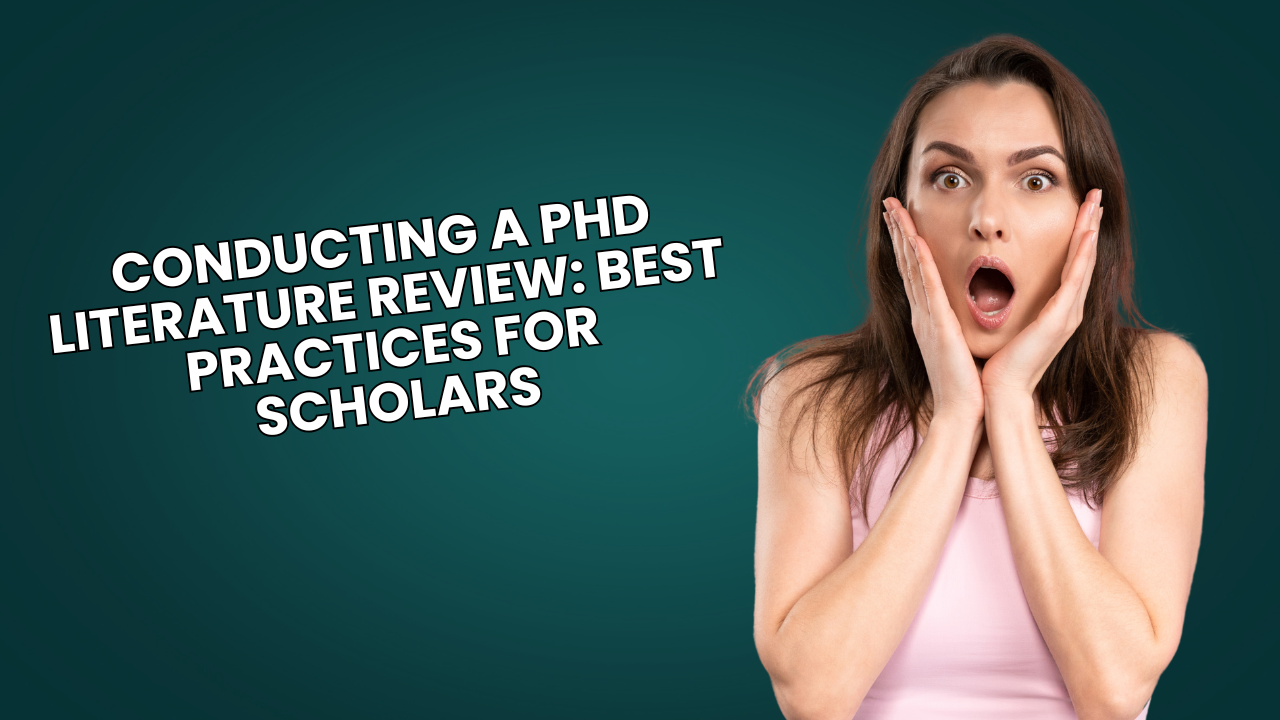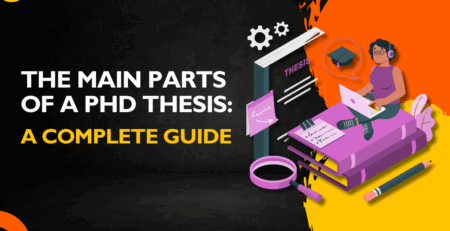Conducting a PhD Literature Review: Best Practices for Scholars
Kenfra Research - Shallo2025-09-26T17:11:53+05:30A PhD literature review is more than just a summary of existing research—it’s a critical foundation for your thesis that defines the context, identifies gaps, and justifies your study. When done effectively, a literature review doesn’t just show what you’ve read; it demonstrates how well you understand the field and how your research fits into the broader academic conversation.
In this comprehensive guide, we’ll cover best practices for conducting a PhD literature review, including step-by-step strategies, tools, and tips that every scholar should know to make their review efficient, thorough, and impactful.

What Is a PhD Literature Review?
A PhD literature review is a comprehensive survey of scholarly sources relevant to a specific research topic. It provides a synthesis of current knowledge, identifies methodological or theoretical gaps, and forms the basis for the research questions and objectives in your thesis.
Goals of a PhD Literature Review:
- Establish context and background
- Identify gaps in the existing literature
- Avoid duplication of existing research
- Justify your research questions
- Define the theoretical framework
Step-by-Step Guide to Conducting a PhD Literature Review
- Define Your Research Scope and Objectives
Before diving into databases, clearly define:
- Your main research question(s)
- Sub-topics and related concepts
- The boundaries of your review (e.g., timeframe, disciplines, geography)
A focused scope helps you filter irrelevant information and stay on track.
- Use Reliable and Diverse Academic Sources
Focus on peer-reviewed journals, books, conference papers, dissertations, and official databases like:
- Scopus
- Web of Science
- PubMed
- JSTOR
- Google Scholar
Use a combination of keywords, Boolean operators (AND, OR, NOT), and filters to narrow your search effectively.
- Organize and Manage Your Sources Efficiently
Use reference management tools such as:
- Zotero
- Mendeley
- EndNote
These tools help you:
- Save citations and PDFs
- Automatically generate bibliographies
- Add tags or notes for better source organization
Efficient management prevents data overload and keeps your literature review structured.
Best Practices for Writing an Effective PhD Literature Review
- Don’t Just Summarize—Synthesize
Rather than summarizing each source individually, group studies into themes, trends, or methodologies and compare their findings. Discuss where they align, contradict, or leave gaps.
Example: Instead of stating, “Author A found X and Author B found Y,” say, “Several studies (Author A, B, C) emphasize X, while others (Author D, E) challenge this by highlighting Y, revealing a debate in the field.”
- Critically Analyze the Literature
Show your understanding by evaluating:
- Methodological strengths and weaknesses
- Theoretical approaches used
- Sample sizes and relevance
- Limitations or biases
Critical analysis sets your review apart from a basic book report.
- Identify Research Gaps
Look for:
- Under-researched populations
- Conflicting evidence
- Outdated theories
- Missing methodological approaches
These gaps justify why your research matters and how it will contribute to the field.
Structuring Your PhD Literature Review
A well-structured literature review enhances readability and clarity. Here’s a typical structure:
- Introduction
- Purpose of the review
- Scope and limitations
- Brief outline of major themes
- Thematic or Chronological Body
Organize the main body by:
- Themes (e.g., technological tools in education, policy implications)
- Chronological order (e.g., historical development of a theory)
- Methodologies (e.g., qualitative vs. quantitative studies)
Each section should include:
- Summary of key sources
- Comparison of findings
- Critical insights
- Conclusion
- Summary of main findings
- Research gaps
- Theoretical or methodological implications
- How this review justifies your research
Tools for Conducting an Efficient PhD Literature Review
- Citation and Reference Management:
- Zotero: Great for tagging and organizing references
- Mendeley: Ideal for collaboration and PDF annotation
- EndNote: Excellent for large-scale bibliographies
- Note-Taking & Mapping Tools:
- Notion or Obsidian: For linking concepts and building knowledge graphs
- MindMeister: Visual mapping of themes and concepts
- Plagiarism and Originality Checkers:
Before submission, use:
- Turnitin
- Grammarly Premium
- Quillbot (for paraphrasing with caution)
Common Mistakes to Avoid in a PhD Literature Review
- Being too descriptive: Focus on synthesis, not summaries.
- Ignoring conflicting evidence: Address contradictions rather than avoiding them.
- Overloading with citations: Quality over quantity—don’t cite everything you find.
- Poor organization: Use subheadings, transitions, and logical flow.
- Neglecting non-English literature: Sometimes, valuable insights exist outside mainstream publications.
Time Management Tips for PhD Literature Review
Conducting a PhD literature review efficiently requires time planning:
Tip 1: Create a Literature Review Timeline
Break your tasks into weekly goals:
- Week 1–2: Define scope and search keywords
- Week 3–4: Collect and filter resources
- Week 5–6: Read and annotate critically
- Week 7–8: Begin drafting sections
- Week 9–10: Revise, edit, and format
Tip 2: Follow the “Two-Hour Rule”
Spend two focused hours each day reading and analyzing literature to avoid burnout.
Tip 3: Use the 80/20 Rule
Spend 80% of your time on the most relevant 20% of the literature that directly informs your research.
Final Thoughts
A well-executed PhD literature review is the backbone of a successful thesis. It not only showcases your knowledge but also clarifies the originality and significance of your research. By applying the best practices for PhD literature review, such as synthesizing findings, using academic tools, staying organized, and managing your time efficiently, you can create a literature review that is both comprehensive and compelling.
Remember, a PhD literature review efficiently conducted early on can save you countless hours later and build a strong foundation for your entire doctoral journey.
Kenfra Research understands the challenges faced by PhD scholars and offers tailored solutions to support your academic goals. From topic selection to advanced plagiarism checking.








Leave a Reply